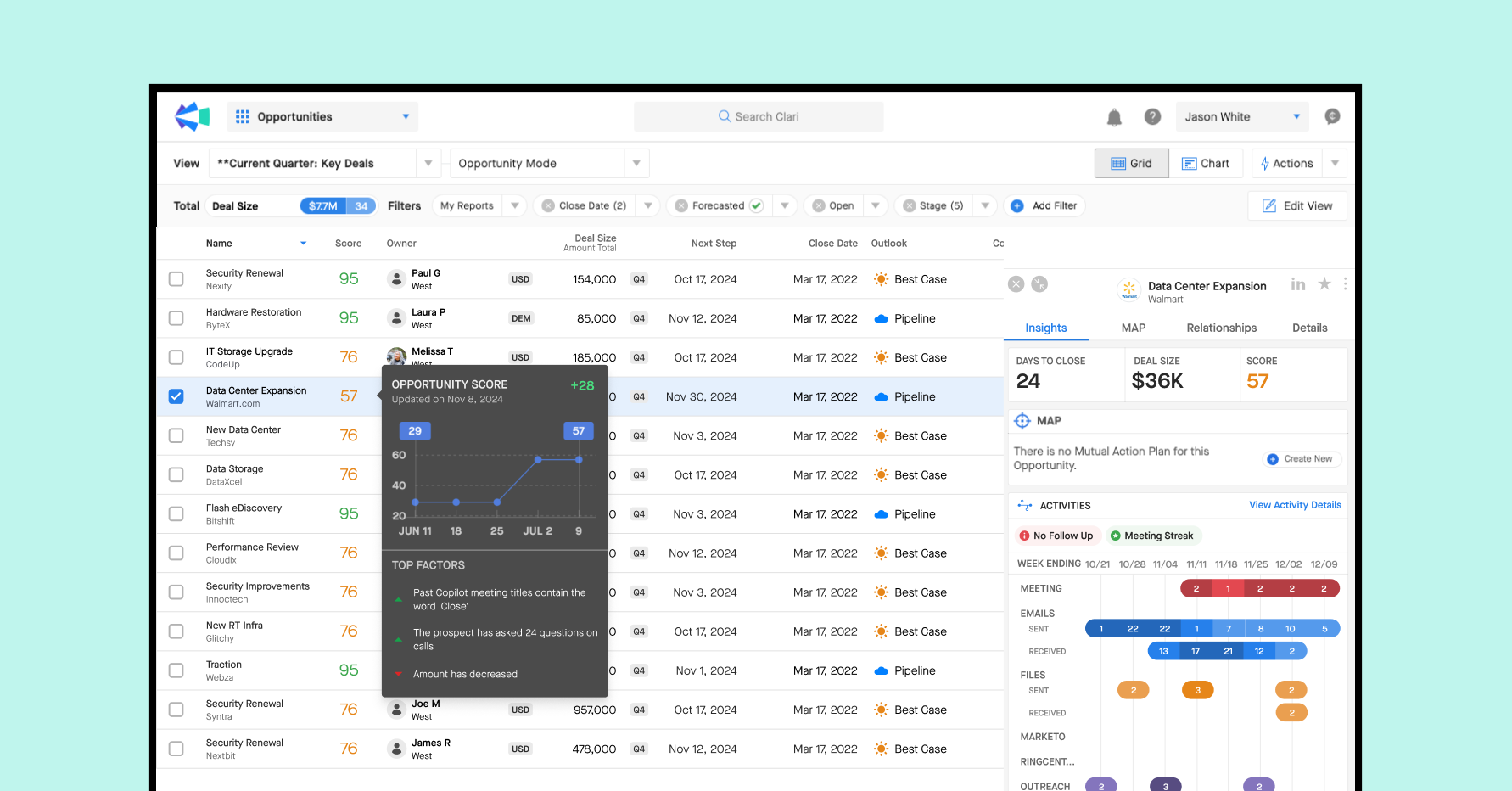
Unleashing Sales Potential: How AI-Powered CRM Opportunity Scoring is Revolutionizing Revenue Generation
Introduction
In today’s hyper-competitive business landscape, sales teams face unprecedented pressure to maximize revenue and drive growth. The traditional sales process, often relying on intuition and manual analysis, is becoming increasingly inefficient. Leads flood in from various sources, opportunities are abundant, yet sales teams struggle to prioritize and focus on the deals most likely to close.
This is where Customer Relationship Management (CRM) systems enhanced with Artificial Intelligence (AI)-guided opportunity scoring come into play. This powerful combination is transforming how sales teams operate, enabling them to identify, prioritize, and pursue the most promising opportunities, leading to higher conversion rates, increased revenue, and a significant competitive advantage.
The Challenge of Traditional Opportunity Management
Before delving into the benefits of AI-powered opportunity scoring, it’s essential to understand the challenges inherent in traditional opportunity management:
- Lead Overload: Sales teams are often inundated with a high volume of leads, many of which are unqualified or unlikely to convert.
- Subjective Prioritization: Opportunity prioritization is often based on gut feelings or incomplete information, leading to wasted time and resources on deals with low potential.
- Manual Data Analysis: Sales reps spend countless hours manually analyzing data, such as customer interactions, demographics, and industry trends, to assess opportunity potential. This is time-consuming and prone to errors.
- Inconsistent Scoring: Different sales reps may use different criteria for evaluating opportunities, resulting in inconsistent scoring and missed opportunities.
- Lack of Real-Time Insights: Traditional CRM systems often lack real-time insights into opportunity health, making it difficult to identify and address potential issues before they escalate.
AI-Guided Opportunity Scoring: A Game Changer
AI-guided opportunity scoring addresses these challenges by leveraging the power of machine learning algorithms to analyze vast amounts of data and predict the likelihood of an opportunity closing successfully. Here’s how it works:
-
Data Collection and Integration: The AI engine gathers data from various sources, including CRM records, marketing automation systems, social media, website analytics, and third-party data providers. This data encompasses customer demographics, engagement history, purchase behavior, industry trends, and competitor information.
-
Feature Engineering: The AI engine identifies and extracts relevant features from the collected data. These features can include:
- Customer demographics (e.g., industry, company size, location)
- Engagement metrics (e.g., website visits, email opens, social media interactions)
- Sales interactions (e.g., number of calls, meetings, emails)
- Deal stage and timeline
- Competitor presence
- Sentiment analysis of customer communications
-
Model Training: The AI engine uses historical sales data to train a machine learning model that learns to identify patterns and correlations between features and successful outcomes. The model is trained on a large dataset of closed deals, both won and lost, to accurately predict the probability of success for new opportunities.
-
Opportunity Scoring: Once the model is trained, it can be used to score new opportunities based on their features. The AI engine assigns a score to each opportunity, indicating its likelihood of closing successfully. This score is typically presented as a percentage or a ranking.
-
Real-Time Updates and Refinement: The AI engine continuously monitors opportunity performance and updates the scores in real-time as new data becomes available. The model is also regularly retrained to ensure its accuracy and relevance over time.
Benefits of AI-Powered CRM Opportunity Scoring
The benefits of implementing AI-powered CRM opportunity scoring are significant:
- Increased Sales Productivity: By focusing on the most promising opportunities, sales reps can spend their time and effort more effectively, leading to higher conversion rates and increased revenue.
- Improved Lead Qualification: AI-powered scoring helps sales teams identify and qualify leads more accurately, ensuring that only the most qualified leads are passed on to sales reps.
- Data-Driven Decision Making: AI provides sales teams with data-driven insights into opportunity potential, enabling them to make more informed decisions and allocate resources more effectively.
- Enhanced Sales Forecasting: AI-powered scoring improves the accuracy of sales forecasts, allowing businesses to better plan for future growth and allocate resources accordingly.
- Personalized Customer Engagement: AI can analyze customer data to identify their needs and preferences, enabling sales reps to tailor their interactions and offer more relevant solutions.
- Reduced Sales Cycle: By focusing on the most promising opportunities and providing sales reps with real-time insights, AI can help shorten the sales cycle and accelerate revenue generation.
- Competitive Advantage: Businesses that leverage AI-powered CRM opportunity scoring gain a significant competitive advantage by being able to identify and pursue the most lucrative opportunities more effectively than their competitors.
- Improved Resource Allocation: AI helps organizations to allocate resources, such as marketing spend and sales efforts, to the opportunities that are most likely to generate revenue.
- Increased Revenue Growth: By optimizing sales processes and improving conversion rates, AI-powered opportunity scoring can lead to significant revenue growth.
Implementation Considerations
Implementing AI-powered CRM opportunity scoring requires careful planning and execution. Here are some key considerations:
- Data Quality: The accuracy of AI-powered scoring depends on the quality of the data used to train the model. Ensure that your CRM data is clean, complete, and up-to-date.
- Model Training: Train the AI model on a large and representative dataset of historical sales data. The more data you have, the more accurate the model will be.
- Feature Selection: Carefully select the features that are most relevant to predicting opportunity success. Experiment with different features to find the ones that yield the best results.
- Integration with CRM: Ensure that the AI-powered scoring system is seamlessly integrated with your CRM system. This will allow sales reps to access opportunity scores and insights directly within their workflow.
- User Training: Provide sales reps with comprehensive training on how to use the AI-powered scoring system and interpret the results.
- Continuous Monitoring: Continuously monitor the performance of the AI model and retrain it as needed to ensure its accuracy and relevance.
- Ethical Considerations: Be mindful of ethical considerations when using AI to score opportunities. Avoid using data that could lead to bias or discrimination.
The Future of Sales: AI-Driven Opportunity Management
AI-guided opportunity scoring is not just a passing trend; it’s the future of sales. As AI technology continues to evolve, we can expect to see even more sophisticated and powerful solutions that transform the way sales teams operate.
In the future, AI will be able to:
- Predict customer needs and preferences with greater accuracy.
- Automate more of the sales process, freeing up sales reps to focus on building relationships with customers.
- Provide sales reps with real-time coaching and guidance.
- Personalize the sales experience for each customer.
- Identify and mitigate potential risks to deals.
Conclusion
AI-powered CRM opportunity scoring is a game-changing technology that is revolutionizing the way sales teams operate. By leveraging the power of AI, businesses can identify, prioritize, and pursue the most promising opportunities, leading to higher conversion rates, increased revenue, and a significant competitive advantage. As AI technology continues to evolve, we can expect to see even more sophisticated and powerful solutions that transform the way sales teams operate and drive revenue growth. Embracing this technology is no longer a luxury but a necessity for businesses looking to thrive in today’s competitive landscape.

